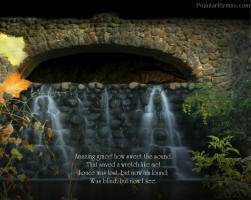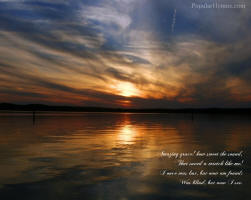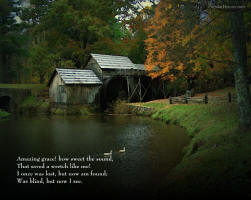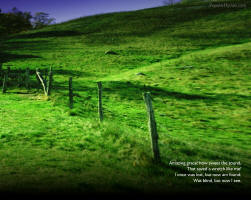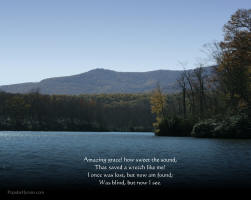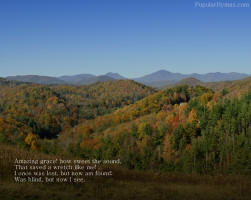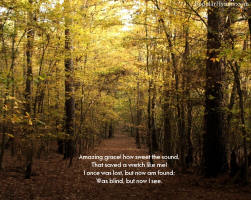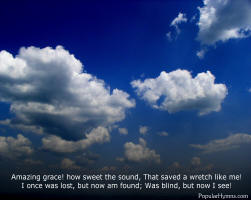Amazing grace! how sweet the sound,
That saved a wretch like me!
I once was lost, but now am found;
Was blind, but now I see.
'Twas grace that taught my heart to fear,
And grace my fears relieved;
How precious did that grace appear
The hour I first believed!
Thro' many dangers, toils and snares
I have already come;
'Tis grace has brought me safe thus far,
And grace will lead me home.
The Lord has promised good to me;
His Word my hope secures;
He will my Shield and Portion be,
As long as life endures.
The earth shall soon dissolve like snow;
The sun forbear to shine;
But God, who called me here below,
Will be forever mine.
When we've been there ten thousand years,
Bright shining as the sun,
We've no less days to sing God's praise
Than when we'd first begun.
Story:
March the 21st is a day to be remembered by me. I
have never suffered it to pass wholly unnoticed since the year 1748.
On that day the Lord sent from on high and delivered me from deep
waters.'
So wrote John Newton in his autobiography, aptly titled, "Out of the
Depths". It was on that memorable day that Newton came into a
personal, saving relationship with Jesus Christ.
Ever since he had been a young boy, John Newton had dreamed of
following in the footsteps of his father, a sea captain. At the tender
age of eleven he joined his father's ship which sailed the warm, blue
waters of the Mediterranean and for the best part of the next twenty
years that ambition was realised.
Life for the young mariner was by no means a matter of 'plain
sailing', however. Growing up, he soon learned the ways of wickedness
- to his terrible cost. He fought with his father, clashed with his
employers, was flogged for desertion, and finally ended up in jail.
Punishment did nothing to change him, and on his release he continued
his immoral living with unrestrained debauchery.
Eventually, by a long sequence of tragic events, he found himself
employed in one of the most despicable of all trades in those days,
slavery.
What a poor, miserable, wretched sinner John Newton turned out to be!
And yet, it was in the Lord's great plan to deliver him and make
something of him.
Here's how it happened. And if you know anything about ships and the
sea you'll be able to put yourself in Newton's shoes; or should it be
sea-boots!
The year was 1748 and it was the month of March, when the seas are at
their most violent.
A raging storm was blowing of the North-West coast of Ireland and
Newton and his ship were caught in the midst of it.
Thundering waves pounded the helpless vessel again and again, crashing
over the decks, filling it with water and threatening to send it and
its crew to the bottom. Newton and his ship-mates strained at the
pumps but it seemed a hopeless task as the mighty waves broke
relentlessly over them.
The ship was just about to break up when Newton, fearing for his very
life, saw a ray of hope.
'If this will not do, then the Lord have mercy on us,' he cried, and
then the thought of 'mercy' came to him again.
'What mercy can there be for me,' he wondered, but, nevertheless,
began to pray in earnest. In a remarkable way God answered and the
storm was abated.
That 'memorable day' as Newton later referred to it was March 21st
1748 and he was then 23 years old.
He finally gave up seafaring in 1755 and was appointed tide surveyor
at Liverpool where he became acquainted with George Whitefiled and
John Wesley.
He began the study of Greek and Hebrew and in 1758 applied to the
archbishop of York for ordination to the Church of England ministry
but was refused.
However, in 1764, he was offered the curacy of the parish of St. Peter
and St. Paul at Olney in Buckinghamshire, and was ordained by the
bishop of Lincoln.
Three years later the poet William Cowper, of whom we'll hear later in
this book, settled in the parish and the two men became firm friends.
Together they published Olney Hymns, for which Newton himself wrote a
number of pieces, including "How Sweet The Name Of Jesus Sounds", and,
most famous of all, "Amazing Grace".
"Amazing Grace" has been a firm favourite with Christians everywhere
for many years. I'm sure it will always remain so. It is, after all,
Newton's own testimony in song, telling the marvellous story of his
transformation from spiritual blindness to sight - and all through
grace.
In I779 Newton left Olney to become rector of St. Mary Woolnoth, in
London. There he continued to exercise an important and fruitful
ministry for the remaining 28 years of his life.
Living in the capital city and close to the seat of power in
government he was able to influence many in authority, among them,
William Wilberforce, the future leader in the campaign to abolish
slavery. That must surely have given the former slave ship captain
particular satisfaction.
John Newton was also a great writer of devotional letters. These are
widely published and some would say were his greatest contributions to
the evangelical movement of those times.
He died in London on December 21st 1807, having served the Lord and
his church faithfully for almost 60 years.
Towards the end of his life he often told his audiences, 'My memory is
nearly gone but I can remember two things; that I am a great sinner
and that Christ is a great Saviour.'
On his tombstone in the churchyard of his former parish at Olney are
these words:
John Newton, clerk, once an infidel and liberine, a servant of slaves
in Africa, was by the rich mercy of our Lord and Saviour, Jesus
Christ, preserved, restored, pardoned and appointed to preach the
faith he had long laboured to destroy.
What else can be said other than that John Newton was well qualified
to preach and describe God's 'Amazing grace'.
Amazing grace! how sweet the sound,
That saved a wretch like me!
I once was lost, but now am found;
Was blind, but now I see.
'Twas, grace that taught my heart to fear,
And grace my fears relieved;
How precious did that grace appear,
The hour I first believed!
Through many dangers, toils and snares
I have already come;
'Tis grace has brought me safe thus far,
And grace will lead me home.
Bible Verses
Luke 15:32
- But we had to celebrate and
rejoice, for this brother of yours was dead and has begun to live, and
was lost and has been found.
Ephesians
2:8 - For by grace you
have been saved through faith; and that not of yourselves, it is the
gift of God;
Desktop Backgrounds
(Click on picture to view full-size)
